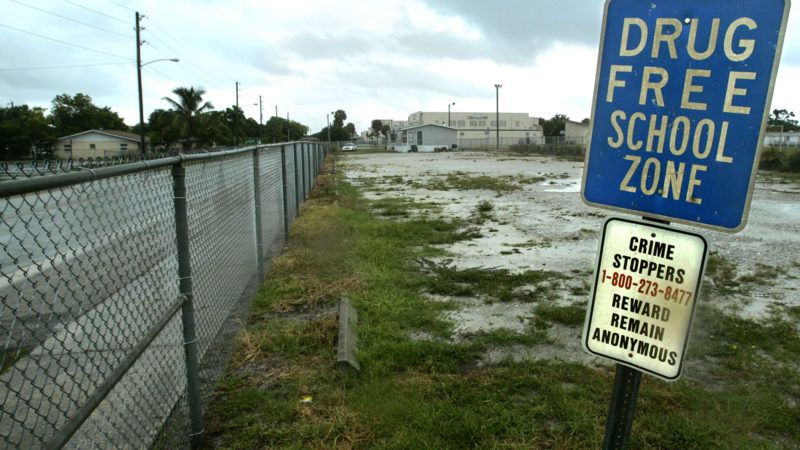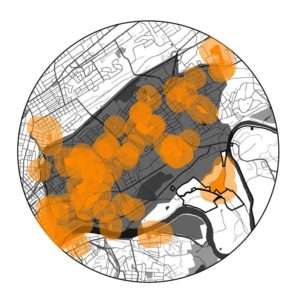Tennessee Passes Drug-Free School Zone Reforms Following Reason Investigation
The harsh laws covered large swaths of Tennessee's cities in enhanced sentencing zones and locked away minor drug offenders for years.

The Tennessee legislature passed a bill Wednesday night significantly reforming its harsh drug-free school zone laws, which were the subject of a 2017 Reason investigation.
The Tennessee House voted 88-4 to pass legislation shrinking the state's drug-free school zones from 1,000 feet to 500 feet. The bill, introduced by Republican state Rep. Michael Curcio, also requires a court to find that a defendant's conduct endangered children or other vulnerable people before mandatory minimum sentences can be applied. The Tennessee Senate unanimously passed the bill last week, and it now goes to Republican Gov. Bill Lee's desk for a signature.
All 50 states and the District of Columbia passed drug-free school zone laws during the 1980s and '90s with the goal of keeping drugs away from kids. However, Reason's investigation revealed that Tennessee's particularly harsh law created enhanced sentencing zones that covered large swaths of cities, extending 1,000 feet from every school, park, library, and daycare. Those zones turned minor drug crimes into mandatory minimum prison sentences that rivaled—and sometimes exceeded—those for second-degree murder and rape.
"While this was well-intentioned, unfortunately, this policy has not been accomplishing the outcome that the legislature intended," Curcio said during a committee hearing on the bill earlier this year. "The main reason for this failure is that drug offenders are not often affected by deterrence-based policies."
"It would also be my argument today that these zones cast far too wide a net in our communities," Curcio continued. "While 1,000 feet might not sound like a lot, over a quarter of the state's total land area within city limits are within a zone."

Reason's analysis of geographic data from the Tennessee government showed that 27 percent of Nashville and more than 38 percent of Memphis were covered by drug-free school zones. Those zones applied day and night, whether or not children were present, and in private residences or when one was simply driving through a zone.
"I'm really excited that the first major sentencing reform bill to pass the Tennessee legislature in decades is drug-free school zone reform," says Lauren Krisai, senior policy analyst at the U.S. Justice Action Network and co-author of Reason's investigation. "Once lawmakers saw how expansive these zones were and how pervasive they've been for so many communities, it was clear that reform was needed."
Civil liberties groups, and even some current and former prosecutors, say such drug-free school zone laws are rarely, if ever, used to prosecute drug cases involving minors. Instead, prosecutors use the threat of a drug-free school zone charge and accompanying mandatory minimum sentence to squeeze guilty pleas out of defendants who had no idea they were in a zone. (In a few cases, Reason found police intentionally set up drug deals inside school zones to secure enhanced charges.)
Take the case of Calvin Bryant, who was 20 years old when he was sentenced in 2008 to 17 years in Tennessee state prison—15 of them mandatory—for selling ecstasy to a confidential informant out of his Nashville apartment, which happened to be within 1,000 feet of a school.
If Bryant had been convicted of second-degree murder, he would have been eligible for an earlier release. That crime carries a minimum 15-year sentence but includes a possibility for release within 13.
After serving 10-and-a-half years in prison, Bryant was released in 2018 after prosecutors struck a deal to release him on time served. Bryant now mentors inner-city youth through a nonprofit organization he started.
Over the past decade, Utah, Indiana, and Massachusetts all passed laws reducing their drug-free school zone laws and associated criminal penalties in response to similar concerns.
Molly Gill, vice president of policy for the criminal justice advocacy group FAMM, says Tennessee's reforms are in some ways both less and more sweeping than other states.
"Utah's [drug-free school zone] is 100 feet from a school," she says. "On the other hand, though, this bill basically restores judicial discretion at sentencing for drug-free school zone offenses, and that's a much bigger step than many other places have been willing to take."
However, the Tennessee law, assuming the governor signs it, would not apply retroactively. Gill says there are currently around 400 inmates in Tennessee state prisons serving sentences for drug-free school zone offenses—a number that does not take into account defendants who pleaded guilty to lesser charges to avoid a school zone conviction.
"A lot of them don't need to be doing that much time and maybe don't need to be there at all anymore," Gill says. "We really hope that the governor will use his clemency power to review those 400 cases and let the people who deserve to go home, go home."
Editor's Note: As of February 29, 2024, commenting privileges on reason.com posts are limited to Reason Plus subscribers. Past commenters are grandfathered in for a temporary period. Subscribe here to preserve your ability to comment. Your Reason Plus subscription also gives you an ad-free version of reason.com, along with full access to the digital edition and archives of Reason magazine. We request that comments be civil and on-topic. We do not moderate or assume any responsibility for comments, which are owned by the readers who post them. Comments do not represent the views of reason.com or Reason Foundation. We reserve the right to delete any comment and ban commenters for any reason at any time. Comments may only be edited within 5 minutes of posting. Report abuses.
Please to post comments


The bill, introduced by Republican state Rep. Michael Curcio
Does that make it good? After all, had it been introduced by a D then it would be bad and terrible and stuff. Right conservative mob? Principals, not principles.
I'm surprised you're not decrying it. Can't have proof the Rs are doing good for minorities, now can you? Might spoil your narrative.
Seriously, why not be glad there's something we can agree on rather than always trying to create more strife and polarization?
My last pay test was $9500 operating 12 hours per week on line. my sisters buddy has been averaging 15k for months now and she works approximately 20 hours every week.ASd i can not accept as true with how easy it become as soon as i tried it out.
This is what do,.......► Home Profit System
So much projection. Sarc becomes more progressive every day
★My last month paycheck was for 1500 dollars… cxc.All i did was simple online work from comfort at home for 3-4 hours/day that I got from this agency I discovered over the internet and they paid me for it 95 bucks every hour.
See---> Money90
Can this work be legally done within 1000 ft of a school, daycare, library, or park?
If not, why not?
i was booted from a jury pool in the '90s for a case involving a young man accused of selling drugs to a cop in a 'school zone." the place mentioned was near the Boeing plant in south Seattle's Georgetown neighborhood. for some reason the prosecutor asked me why i would have a tough time finding the defendant guilty and i mentioned the ridiculous nature of the "school zone" and the prohibition of a voluntary transaction....
i think the entire jury was dismissed
It's all good now
Seattle doesn't have laws anymore
I honestly hope they let CHAZ just go. It is unbelievably entertaining. Best case scenario, it survives and does well and proves that good things can happen with voluntary cooperation (save the people that had their property stolen) and without a centralized power. It could also act as a demonstration of the best kind of federalism meaning radically different systems from city to city, state to state. Not so likely.
It could also show that leftists are bunch of hypocritical, entitled babies that have no leadership skills or even basic survival skills that would be needed to survive autonomously. The leadership that will show up (or allegedly already has) isn't going to look very much like what they think it will. Hilarity, with a side of horrific violence, will ensue. Very likely.
Either way, I'm already going back for my third refill on popcorn while I watch.
I honestly hope they let CHAZ just go.
and grow!
It's not CHAZ any more. They renamed it CHOP after they were forced to retreat to half the area they originally occupied.
I can see the people who live in the area get fed up, form up a posse, and collect baseball bats and run off those sad excuses for anarchists. Who would stop them? There are no cops. Finally a good use for covid masks and anonymity
I'm hoping they continue to leave it alone for awhile and let it develop into an American Christiania. Pretty soon, it will either fall apart or settle into a stable self-governing place. It's good to have lots of these experimental communities around. The ones that end up working help to show what sort of laws are unnecessary.
I've been to Freetown Christiania (still use the Clipper lighter I got there) and I dont think that place in Seattle will turn into it.
Freetown was started by drug dealers after all, they are much more honest and principled than those woke lefties!!!
Coercive govt. would be fine if we could limit it with the right laws.
What’s wrong with this approach to resolve the constant conflict between govt. and citizens?
“There are a thousand hacking at the branches of evil for every one hacking at the root.” HDT
And, attacking the chronic corruption doesn’t work. Institutionalized violence can’t be fixed. It’s fatally flawed. It’s the root of the problem.
The solution is a voluntary system of governance based on reason, rights, choice. That would be new, require a lot of cooperation and a commitment to respect the individual over all else.
Can a society change its primitive public policy and act civil, be a beacon for humanity?
End the drug war.
The WHOLE drug war.